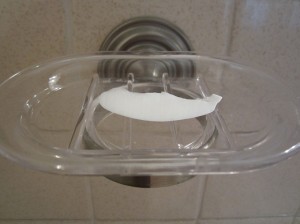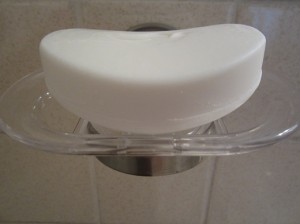Although life’s big problems can swamp us, sometimes it’s the little things that do us in. Married couples discover this when they learn they don’t squeeze the toothpaste alike. But all of us can get peeved at small stuff that eventually become our “pet peeves.”
I remember being at a couple’s party with Nate years ago where we played The Newlywed Game. One of the questions they asked me while Nate was out of the room was, “What is your husband’s pet peeve?”
I said, “Oh, that’s easy. Wasting time in traffic.”
When Nate came back in, they asked him the same question, and he said, “That’s easy. Cold toast.”
Though he’d probably told me many times, I never corrected the problem because cold toast didn’t bother me. Poor guy. No wonder it became his pet peeve.
Today I did battle with one of my own pet peeves. I’ve always been bothered by that last sliver of bar soap that’s hard to finish. It gets small, then won’t suds-up, and easily slips away.
After “losing” my paper-thin soap in the water multiple times today, I decided to toss it out. (When I did, I heard Mom say, “During the Great Depression we had to make our own! Don’t waste that!”) It didn’t feel good throwing it away, but it instantly eliminated my pet peeve. Besides, it sure was fun putting a plump new bar in the soap dish.
I’ll bet God has a long list of pet peeves about me. In studying Scripture I’ve seen what kind of person he wants me to be, and in a thousand ways I’m not. The Old Testament tells us about God getting peeved enough to obliterate the entire human race. Later he threatened to do away with all the Children of Israel, which amounted to millions.
No doubt he gets pretty peeved with the rest of us, too. And my guess is that his “Pet Peeves List” hasn’t changed too much in thousands of years. So do we have to worry about being zapped into oblivion? No, if we work at one thing: not getting him peeved.
But how?
Just as earthly parents appreciate their children’s’ desire to improve and then eagerly help them to do it, so God responds to our desire to change by rushing toward us to facilitate it. It’s like a young child asking his mother for money to buy her a Mother’s Day gift. Happily, she gives it to him. God hopes we’ll act in godliness, and when we say we want to, he’ll empower us to make it happen.
My only question now is, should I dig that soap-sliver out of the trash?
“Continue to work out your salvation with fear and trembling, for it is God who works in you to will and to act in order to fulfill his good purpose.” (Philippians 2:12-13)









